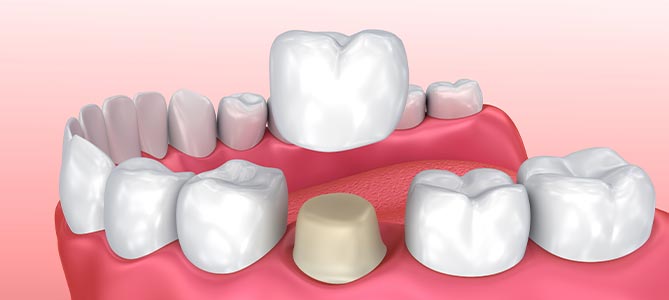Types of Dental Crowns Q&A
A dental crown fits over your natural tooth to restore its shape and functionality. Discover how a tooth crown can keep you happy and your smile healthy. Visit Selective Dental today to learn more. For more information, contact us today or schedule an appointment online. We are conveniently located at 3151 South White Road, Suite 203 San Jose, CA 95148.


Table of Contents:
When would you need a dental crown?
What are the types of dental crowns?
What happens during a dental crown procedure?
Are dental crowns permanent?
You would need a dental crown in the following circumstances:
• Tooth decay – When a tooth is significantly decayed and cannot be adequately restored with a filling, a crown is used to protect and strengthen the tooth.
• Cosmetic reasons – Dental crowns improve the look of misshapen, discolored, or severely stained teeth, to enhance your smile.
• Fractured or broken tooth – If a tooth is cracked, fractured, or weakened due to injury or extensive wear, a crown is used to provide support and prevent further damage.
• Dental implants – Crowns are used to replace missing teeth in conjunction with dental implants. They provide a natural-looking and functional tooth replacement solution.
• Root canal treatment – After a root canal procedure, a tooth can become more brittle and prone to fracture. For this reason, a crown is placed to protect and strengthen the tooth.
The various types of dental crowns include:
• Porcelain crowns – These crowns are known for their natural appearance, as they mimic the translucency of natural teeth. They are an excellent choice for restoring front teeth or others that are visible when you smile.
• Metal crowns – Made from alloys like gold, metal crowns are durable and can withstand the force of chewing. They are often used for molars due to their strength and longevity.
• Ceramic crowns – Similar to porcelain crowns, ceramic crowns are highly aesthetic and can blend seamlessly with your natural teeth.
• Porcelain-fused-to-metal crowns – PFM crowns combine the aesthetics of porcelain with the strength of metal. They have a metal substructure covered with a layer of porcelain, making them suitable for both front and back teeth.
• Zirconia crowns – Zirconia is a strong and durable material that can be used for both anterior and posterior teeth. It offers a natural look and is resistant to chipping and cracking.
• Composite resin crowns – These crowns are made from a tooth-colored composite resin material. They are less durable than other types and are therefore used as short-term solutions.
A dental crown procedure is a multi-step process that involves the following stages:
• Consultation and examination – The dentist will examine your tooth to determine if a crown is necessary. X-rays may need to be taken to assess the extent of damage or decay.
• Tooth preparation – During the initial appointment, the tooth receiving the crown is prepared. This involves removing any decayed or damaged areas and shaping the tooth to fit the crown.
• Impression and creation of crown – An impression of the prepared tooth is taken to create a mold. Using the impression, the permanent crown is crafted. Depending on the material chosen, this process can take a few weeks.
• Temporary crown – If needed, a temporary crown is placed on the prepared tooth while the permanent crown is being made.
• Crown placement – Once the permanent crown is ready, you will return for a second appointment. The temporary crown will be removed and the new crown will be checked for fit, color, and alignment.
• Cementation – Once placed, the permanent crown is cemented to the prepared tooth.
• Final polishing – Lastly, the crown is polished to blend seamlessly with your natural teeth and provide a comfortable bite.
Dental crowns are a long-lasting solution to various dental issues, but they are not fully permanent. While dental crowns can provide durability and functionality for many years, they often eventually require replacement due to factors such as wear, damage, or changes in the underlying tooth structure.
The lifespan of a dental crown depends on a few factors, including the material used, the location of the crown in your mouth, your oral hygiene practices, and your dental health. On average, dental crowns last anywhere from 5 to 15 years or longer with proper care. It’s essential to maintain good oral hygiene, including regular brushing, flossing, and dental check-ups, to extend the life of your dental crown. Additionally, avoiding habits like chewing on hard objects and grinding your teeth will also extend the crown’s lifespan.
If you notice any signs of damage, discomfort, or looseness, it’s important to consult your dentist promptly. Our team can assess the condition of the crown and determine whether repair or replacement is best. We serve patients from all over Santa Clara County CA: San Jose, Milpitas, Santa Clara, Campbell, Sunnyvale, Cupertino, Saratoga, Los Gatos, and Beyond!

Additional Services You May Need
- Dental Implants
- Dental Bridges
- Dental Crowns
- Gum Disease Treatment
- Smile Makeover
- Root Canal Therapy
- Teeth Whitening
- Dental Cleanings
- Veneers
- Cracked Tooth Treatment
- Emergency/Same-Day Services
- General Dentistry
- Cosmetic Dentistry
- Family Dentistry
- Children Dentistry
- Aesthetic Dentistry
- TMJ Treatment
- Extractions
- Emergency Dental Appointments
- Mouth Guards and Night Guards
- Ortho Retainers
- Dental Implant Crowns

Additional Services You May Need
- Dental Implants
- Dental Bridges
- Dental Crowns
- Gum Disease Treatment
- Smile Makeover
- Root Canal Therapy
- Teeth Whitening
- Dental Cleanings
- Veneers
- Cracked Tooth Treatment
- Emergency/Same-Day Services
- General Dentistry
- Cosmetic Dentistry
- Family Dentistry
- Children Dentistry
- Aesthetic Dentistry
- TMJ Treatment
- Extractions
- Emergency Dental Appointments
- Mouth Guards and Night Guards
- Ortho Retainers
- Dental Implant Crowns






